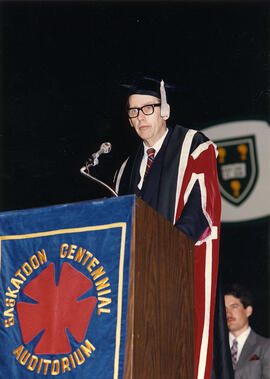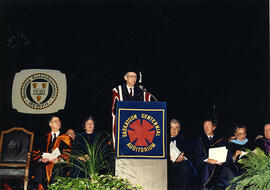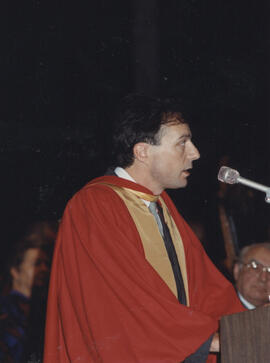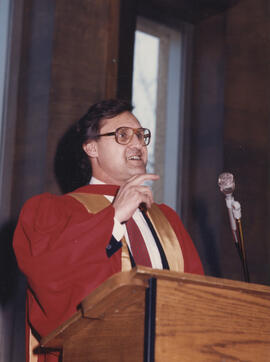Honourary Degrees - Presentation - D. Bruce Sealey
- A-7939
- Item
- May 1985
Emmett M. Hall, University Chancellor, making presentation of an honourary Doctor of Laws degree to D. Bruce Sealey at spring Convocation held at Centennial Auditorium.
Bio/Historical Note: Donald Bruce Sealey was born at Pine Creek, Manitoba in 1927, Bruce Sealey received his high school education in Arden, where he subsequently worked as a dog-team freighter, fisherman and farmer. He taught for the Federal Department of Indian Affairs in the late 1940s in various remote Native communities, aided by his fluency in Cree and his Metis heritage. Over the next two decades Sealey was a vice-principal, principal, then consultant, while concurrently completing his BA and BEd degrees at the University of Manitoba. A one-year term at the University of Minnesota in Native American Studies augmented his work experience. In 1970 he was appointed Associate Professor of Education at his alma mater where he developed and implemented a Cross-Cultural Studies program for teachers. He completed his MEd degree and defended his theses - "... the Effects of Oral English Language on School Achievement of Indian and Metis High School Students." He worked with the Manitoba Metis Federation as Chairman of the Education Committee, Consultant, and as the Director. Sealey was recognized by the Metis people for his work by the award of the Order of the Sash. The Royal Canadian Mounted Police retained Sealey as an instructor on cross-cultural education of the Police College in Ottawa and the RCMP regional posts in Winnipeg and Regina. Sealey published over two dozen scholarly articles, published almost twice this number of books and/or chapters of books, and has edited numerous journals He was chairman of the Board of Directors of Pemmican Publishers and of the Manitoba Metis Federation Economic Development Training Program. Sealey died in Winnipeg in 2005.









